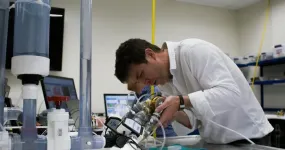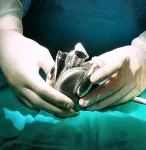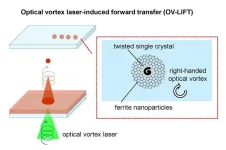(Press-News.org) Houston, Texas, July 25, 2024 – The Texas Heart Institute (THI) and BiVACOR®, a clinical-stage medical device company, announced today the successful first-in-human implantation of the BiVACOR Total Artificial Heart (TAH) as part of the U.S. Food and Drug Administration (FDA) Early Feasibility Study (EFS) on July 9, 2024. BiVACOR’s TAH is a titanium-constructed biventricular rotary blood pump with a single moving part that utilizes a magnetically levitated rotor that pumps the blood and replaces both ventricles of a failing heart.
The first-in-human clinical study aims to evaluate the safety and performance of the BiVACOR TAH as a bridge-to-transplant solution for patients with severe biventricular heart failure or univentricular heart failure in which left ventricular assist device support is not recommended. Following this first implantation completed at Baylor St. Luke’s Medical Center in the Texas Medical Center, four additional patients are to be enrolled in the study.
“The Texas Heart Institute is enthused about the groundbreaking first implantation of BiVACOR’s TAH. With heart failure remaining a leading cause of mortality globally, the BiVACOR TAH offers a beacon of hope for countless patients awaiting a heart transplant,” said Dr. Joseph Rogers, President and Chief Executive Officer of The Texas Heart Institute and National Principal Investigator on the research. “We are proud to be at the forefront of this medical breakthrough, working alongside the dedicated teams at BiVACOR, Baylor College of Medicine, and Baylor St. Luke’s Medical Center to transform the future of heart failure therapy for this vulnerable population.”
Daniel Timms, PhD, Founder and Chief Technology Officer of BiVACOR said, “I’m incredibly proud to witness the successful first-in-human implant of our TAH. This achievement would not have been possible without the courage of our first patient and their family, the dedication of our team, and our expert collaborators at The Texas Heart Institute. Utilizing advanced MAGLEV technology, our TAH brings us one step closer to providing a desperately needed option for people with end-stage heart failure who require support while waiting for a heart transplant. I look forward to continuing the next phase of our clinical trial.”
Heart failure is a global epidemic affecting at least 26 million people worldwide, 6.2 million adults in the U.S., and is increasing in prevalence. Heart transplantations are reserved for those with severe heart failure and are limited to fewer than 6,000 procedures per year globally. Consequently, the U.S. National Institutes of Health estimated that up to 100,000 patients could immediately benefit from mechanical circulatory support (MCS), and the European market is similarly sized.
The successful implantation of BiVACOR’s TAH highlights the potential of innovative technologies to address critical challenges in cardiac care, such as long transplantation waitlists. BiVACOR and The Texas Heart Institute remain committed to advancing the field of cardiac medicine and improving outcomes for patients worldwide.
About the BiVACOR Total Artificial Heart
The BiVACOR TAH represents a paradigm shift in artificial heart design. The size of the BiVACOR TAH is suitable for most men and women (Body Surface Area >1.4 m2). Despite its small size, the BiVACOR TAH is capable of providing enough cardiac output for an adult male undergoing exercise. Using magnetic levitation technology, the same principle used in high-speed trains, the product features a unique pump design with a single moving part: a magnetically suspended dual-sided rotor with left and right vanes positioned within two separate pump chambers, forming a double-sided centrifugal impeller that propels blood from the respective pump chambers to the pulmonary (lung) and systemic (body) circulations. The TAH has no valves or flexing ventricle chambers, with MAGLEV making pulsatile outflow possible by rapidly cycling the pump’s rotor. The non-contact suspension of the rotor via MAGLEV is designed to eliminate the potential for mechanical wear and provide large blood gaps that minimize blood trauma, offering a durable, reliable, and biocompatible heart replacement.
About BiVACOR®
BiVACOR® is a clinical-stage medical device company pioneering the development of a long-term therapy for patients with biventricular heart failure. Under the expert direction of its founder and TAH inventor, Daniel Timms, PhD, and the guidance of two luminaries in cardiovascular surgery, William E. Cohn, MD, and O.H. (Bud) Frazier, MD, the BiVACOR TAH is currently undergoing an FDA-approved first-in-human EFS. Headquartered in Huntington Beach, California, with clinical offices in Houston, Texas, and international offices in Gold Coast, Australia, BiVACOR is committed to addressing the global unmet need of patients with end-stage heart failure awaiting transplant by providing the next generation of life-extending solutions. For more information, visit bivacor.com.
About The Texas Heart Institute®
The Texas Heart Institute (THI) is an independent, nonprofit organization with the mission of improving cardiovascular health today through trailblazing research, thought leadership, education, and patient care. Located within the Texas Medical Center in Houston, Texas, and founded in 1962 by renowned cardiac surgeon Dr. Denton Cooley, THI performed the first successful heart transplant and total artificial heart implant in the United States. Since then, its physicians and surgeons have remained recognized as worldwide leaders in diagnosing and treating even the most complex cardiovascular conditions. Research programs at THI continue pushing cardiovascular science’s boundaries by translating laboratory discovery into patient care. THI has been ranked among the top cardiovascular centers in the United States by US News & World Report for over 30 years. The Texas Heart Institute has an equity ownership interest in BiVACOR. www.texasheart.org @texasheartinstitute
About Baylor St. Luke’s Medical Center
Baylor St. Luke’s Medical Center is an 881-bed quaternary care academic medical center that is a joint venture between Baylor College of Medicine and St. Luke’s Health. Located in the Texas Medical Center, the hospital is the home of the Texas Heart Institute, a cardiovascular research and education institution founded in 1962 by Denton A. Cooley, MD. The hospital was the first facility in Texas and the Southwest designated a Magnet hospital for Nursing Excellence by the American Nurses Credentialing Center, receiving the award four consecutive times. Baylor St. Luke’s also has three community emergency centers offering adult and pediatric care for the Greater Houston area.
Baylor College of Medicine
Baylor College of Medicine (www.bcm.edu) in Houston is recognized as a health sciences university and is known for excellence in education, research and patient care. Baylor is a top-ranked medical school and listed 20th among all U.S. medical schools for National Institutes of Health funding and No. 1 in Texas. Located in the Texas Medical Center, Baylor has affiliations with seven teaching hospitals and jointly owns and operates Baylor St. Luke’s Medical Center, part of St. Luke’s Health. Currently, Baylor has more than 3,000 trainees in medical, graduate, nurse anesthesia, physician assistant, orthotics and genetic counseling as well as residents and postdoctoral fellows. Follow Baylor College of Medicine on Facebook (http://www.facebook.com/BaylorCollegeOfMedicine) and Twitter (http://twitter.com/BCMHouston).
About Texas Medical Center
Texas Medical Center — the largest medical city globally—is at the forefront of advancing life sciences. Home to the brightest minds in medicine, TMC nurtures cross-institutional collaboration, creativity, and innovation among its 106,000-plus employees. With a campus of more than 50 million square feet, TMC annually hosts 10 million patients, performs over 180,000 surgeries, conducts over 750,000 ER visits, serves close to 14,000 heart surgeries, and delivers over 25,000 babies. Beyond patient care, TMC is pushing the boundaries of clinical research across its extensive network of partner institutions daily, pioneering effective health policy solutions to address today’s complex health care issues, and cultivating cutting-edge digital health applications and medical devices.
Media Contacts:
Inquiries related to the BiVACOR Total Artificial Heart (TAH):
Alexander Romero-Wilson, Health+Commerce (for BiVACOR)
alexander@healthandcommerce.com
Inquiries related to The Texas Heart Institute, Baylor St. Luke’s Medical Center, and Texas Medical Center:
Jon Myers, The Texas Heart Institute
jmyers@texasheart.org
END
The Texas Heart Institute implants BiVACOR® Total Artificial Heart
First-in-human novel valveless artificial heart implanted in a patient with end-stage heart failure as a bridge to heart transplant
2024-07-25
ELSE PRESS RELEASES FROM THIS DATE:
University of Washington researchers take flight with new insights on bat evolution
2024-07-25
University of Washington Researchers Take Flight with New Insights on Bat Evolution
Video Interview with Authors - https://youtu.be/6rogrh2_HN0
In new research published in PeerJ Life & Environment, researchers from the University of Washington, University of Texas at Austin and Oregon Institute of Technology, led by undergraduate student Abby Burtner, have advanced our understanding of the evolutionary origins of flight in bats. The study, titled "Gliding toward an Understanding of the Origin of Flight in Bats," employs phylogenetic comparative methods to explore the evolutionary transition from gliding to powered flight in these unique mammals.
Bats ...
Tanzanian officials praise NEST360 contribution to newborn care
2024-07-25
HOUSTON – (June 25, 2024) – Rice University President Reginald DesRoches joined Rice360 Institute for Global Health Technologies Co-Director Maria Oden and Rice360 supporters on a trip to Africa this summer marking significant milestones on the road to ending preventable newborn deaths in the sub-Saharan region. Rice360 is one of 22 organizations in the Newborn Essential Solutions and Technologies (NEST360) international alliance, and this trip signified Rice’s continued collaboration ...
4D Medicine raises £3.4 million for unique biomaterial platform
2024-07-25
4D Medicine, a spin-out from the Universities of Birmingham and Warwick has raised £3.4m ($4.4m) in a Series A investment.
The funding round was backed by Oshen Holdings, DSW Ventures, SFC Capital, Boundary Capital and private investors including several leading scientists and surgeons. It will enable the company to complete pre-clinical testing of its first product range and seek FDA clearance for entry into the US market.
4D is a UK-based company whose innovative biomaterial has potential to be used for a wide range of 3D printed implants and surgical devices. Its product 4Degra is a resorbable biomaterial that is being used to develop ...
Ancient marine animal had inventive past despite being represented by few species, new study finds
2024-07-25
The findings, published today in Nature Ecology & Evolution, sheds light on some core principles of the evolution of modern biodiversity.
In current oceans, molluscs such as clams, oysters, and snails are hugely diverse, with over 50,000 species, whereas brachiopods are rare by comparison with only 394 species known. But this was not always the case. The team have found that brachiopods were evolving new shell shapes and ecological behaviours following the end-Permian mass extinction which compromised their numbers.
“In the Palaeozoic, from 540 to 250 million years ago, brachiopods ruled the seabed,” ...
Quantum sensor for the atomic world developed through international scientific collaboration
2024-07-25
In a scientific breakthrough, an international research team from Germany's Forschungszentrum Jülich and Korea's IBS Center for Quantum Nanoscience (QNS) developed a quantum sensor capable of detecting minute magnetic fields at the atomic length scale. This pioneering work realizes a long-held dream of scientists: an MRI-like tool for quantum materials.
The research team utilized the expertise of bottom up single-molecule fabrication from the Jülich group while conducting experiments at QNS, utilizing the Korean team’s leading-edge ...
The research was wrong: study shows moderate drinking won’t lengthen your life
2024-07-25
PISCATAWAY, NJ – Probably everyone has heard the conventional wisdom that a glass of wine a day is good for you--or you’ve heard some variation of it. The problem is that it’s based on flawed scientific research, according to a new report in the Journal of Studies on Alcohol and Drugs.
Over the years, many studies have suggested that moderate drinkers enjoy longer lives with lower risks of heart disease and other chronic ills than abstainers do. That spurred the widespread belief that alcohol, in moderation, can be a health tonic. However, not all studies have painted such a rosy picture--and the ...
Save your data on printable magnetic devices? New laser technique’s twist might make this reality
2024-07-25
The proliferation of all things digital doesn’t mean that printing technology is no longer relevant. In fact, printing technology is required to make the semiconductors necessary for the digital world. And as an Osaka Metropolitan University-led team has shown using a new printing technique, printable magnetic devices for high-density data storage might soon be realized.
Dr. Ken-ichi Yuyama, a lecturer at the Graduate School of Science, and his colleagues report in APL Materials on the development of a new type of laser-induced forward transfer ...
Early onset dementia more common than previously reported – the incidence of Alzheimer’s disease seems to be on the rise
2024-07-25
A new major study by the University of Eastern Finland, the University of Oulu and Neurocenter Finland explored early-onset dementia in the working-age population in Finland. The study cohort was one of the largest in the world to date, and the findings were published on 24th of July 2024 in Neurology®, the medical journal of the American Academy of Neurology.
Current epidemiological data on early-onset dementia is scarce and based on small study cohorts, with no recent data from Finland available. For the present ...
Pesticides potentially as bad as smoking for increased risk in certain cancers
2024-07-25
In modern day agriculture, pesticides are essential to ensure high enough crop yields and food security. These chemicals, however, can adversely affect plant and animal life as well as the people exposed to them.
Now, in a population-based, nation-wide study, researchers in the US have put increased cancer risk through agricultural pesticide use into context with smoking, a better understood cancer risk factor. The results were published in Frontiers in Cancer Control and Society.
“In our study we found that for some cancers, the effect of agricultural pesticide usage is comparable in magnitude to the effect of smoking,” said the study’s ...
NUS researchers develop new battery-free technology to power electronic devices using ambient radiofrequency signals
2024-07-25
Ubiquitous wireless technologies like Wi-Fi, Bluetooth, and 5G rely on radio frequency (RF) signals to send and receive data. A new prototype of an energy harvesting module – developed by a team led by scientists from the National University of Singapore (NUS) – can now convert ambient or ‘waste’ RF signals into direct current (DC) voltage. This can be used to power small electronic devices without the use of batteries.
RF energy harvesting technologies, such as this, is essential as they reduce battery dependency, extend device lifetimes, minimise environmental impact, and enhance the feasibility of wireless sensor networks and IoT devices in remote ...
LAST 30 PRESS RELEASES:
Jeonbuk National University researchers develop an innovative prussian-blue based electrode for effective and efficient cesium removal
Self-organization of cell-sized chiral rotating actin rings driven by a chiral myosin
Report: US history polarizes generations, but has potential to unite
Tiny bubbles, big breakthrough: Cracking cancer’s “fortress”
A biological material that becomes stronger when wet could replace plastics
Glacial feast: Seals caught closer to glaciers had fuller stomachs
Get the picture? High-tech, low-cost lens focuses on global consumer markets
Antimicrobial resistance in foodborne bacteria remains a public health concern in Europe
Safer batteries for storing energy at massive scale
How can you rescue a “kidnapped” robot? A new AI system helps the robot regain its sense of location in dynamic, ever-changing environments
Brainwaves of mothers and children synchronize when playing together – even in an acquired language
A holiday to better recovery
Cal Poly’s fifth Climate Solutions Now conference to take place Feb. 23-27
Mask-wearing during COVID-19 linked to reduced air pollution–triggered heart attack risk in Japan
Achieving cross-coupling reactions of fatty amide reduction radicals via iridium-photorelay catalysis and other strategies
Shorter may be sweeter: Study finds 15-second health ads can curb junk food cravings
Family relationships identified in Stone Age graves on Gotland
Effectiveness of exercise to ease osteoarthritis symptoms likely minimal and transient
Cost of copper must rise double to meet basic copper needs
A gel for wounds that won’t heal
Iron, carbon, and the art of toxic cleanup
Organic soil amendments work together to help sandy soils hold water longer, study finds
Hidden carbon in mangrove soils may play a larger role in climate regulation than previously thought
Weight-loss wonder pills prompt scrutiny of key ingredient
Nonprofit leader Diane Dodge to receive 2026 Penn Nursing Renfield Foundation Award for Global Women’s Health
Maternal smoking during pregnancy may be linked to higher blood pressure in children, NIH study finds
New Lund model aims to shorten the path to life-saving cell and gene therapies
Researchers create ultra-stretchable, liquid-repellent materials via laser ablation
Combining AI with OCT shows potential for detecting lipid-rich plaques in coronary arteries
SeaCast revolutionizes Mediterranean Sea forecasting with AI-powered speed and accuracy
[Press-News.org] The Texas Heart Institute implants BiVACOR® Total Artificial HeartFirst-in-human novel valveless artificial heart implanted in a patient with end-stage heart failure as a bridge to heart transplant








